

Al-Suyuti. Jalal al-Din al-Suyuti (Arabic: جلال الدين السيوطي) (c. 1445–1505 AD), whose full Arabic name is Abu al-Fadl 'Abd al-Rahman b.
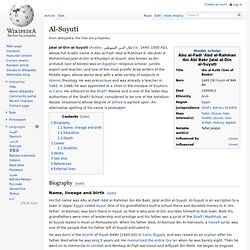
Abi Bakr b. Ahmad Sirhindi. Imām Rabbānī Shaykh Ahmad al-Farūqī al-Sirhindī (1564–1624) was an Indian Islamic scholar from Punjab, a Hanafi jurist, and a prominent member of the Naqshbandī Sufi order.
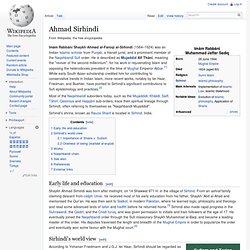
He is described as Mujaddid Alf Thānī, meaning the "reviver of the second millennium", for his work in rejuvenating Islam and opposing the heterodoxies prevalent in the time of Mughal Emperor Akbar.[1] While early South Asian scholarship credited him for contributing to conservative trends in Indian Islam, more recent works, notably by ter Haar, Friedman, and Buehler, have pointed to Sirhindi's significant contributions to Sufi epistemology and practices.[2] Most of the Naqshbandī suborders today, such as the Mujaddidī, Khālidī, Saifī, Tāhirī, Qasimiya and Haqqānī sub-orders, trace their spiritual lineage through Sirhindi, often referring to themselves as "Naqshbandī-Mujaddidī". Sirhindi's shrine, known as Rauza Sharif is located in Sirhind, India.
Early life and education[edit] Sirhindi's world view[edit] Usman dan Fodio. Shaihu Usman dan Fodio, born Usuman ɓii Foduye, (also referred to as Shaikh Usman Ibn Fodio, Shehu Uthman Dan Fuduye, or Shehu Usman dan Fodio, 1754–1817) was a religious teacher, writer and Islamic promoter, and the founder of the Sokoto Caliphate.
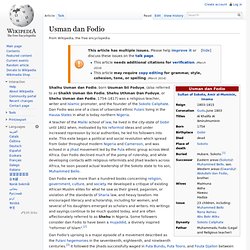
Dan Fodio was one of a class of urbanized ethnic Fulani living in the Hausa States in what is today northern Nigeria. A teacher of the Maliki school of law, he lived in the city-state of Gobir until 1802 when, motivated by his reformist ideas and under increased repression by local authorities, he led his followers into exile.
This exile began a political and social revolution which spread from Gobir throughout modern Nigeria and Cameroon, and was echoed in a jihad movement led by the Fula ethnic group across West Africa. Shah Abdul Aziz. Al Muhaddith Shah Abdul Aziz Dehlavi ( 1745- 1823 [1] or d 1823 CE [1][2]) (Arabic: المحدث شاه عبدالعزيز دهلاوي) was one of the great Sunni Islamic scholar scholars of Hadith in India.[2] Biography[edit] Shah Abdul Aziz was the eldest son of Shah Waliullah was only 17 years old when Shah Waliullah died.

He took over as the teacher of Hadith in place of his father, and later became famous as the Muhaddith of Delhi (just like his father) and one of India's greatest Irs. Teachers[edit] He was taught by his father, Shah Waliullah Dehlvi (R'A), as well as by his father's two students, Khwaja Aminullah and Shah Muhammad Ashiq. Legacy[edit] Works[edit] He wrote and dictated several books,[1] even if some differ on the number (from fifty to nearly two hundred):[3] Category:Mujaddid. Mirza Ghulam Ahmad. Mirzā Ghulām Ahmad[4] (Urdu: مرزا غلام احمد, Hindi: मिर्जा गुलाम अहमद; 13 February 1835 – 26 May 1908 CE, or 14 Shawal 1250 – 24 Rabi' al-thani 1326 AH) was a religious figure from India and the founder of the Ahmadiyya Movement in Islam.
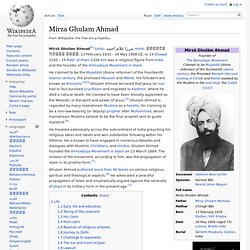
He claimed to be the Mujaddid (divine reformer) of the Fourteenth Islamic century, the promised Messiah and Mahdi. His followers are known as Ahmadis.[2][3] Ghulam Ahmad declared that Jesus (or Isa) had in fact survived crucifixion and migrated to Kashmir, where he died a natural death. He claimed to have been divinely appointed as the Messiah, in the spirit and power of Jesus.[5] Ghulam Ahmad is regarded by many mainstream Muslims as a heretic, for claiming to be a non-law-bearing (or deputy) prophet after Muhammad, whom mainstream Muslims believe to be the final prophet sent to guide mankind.[6] He traveled extensively across the subcontinent of India preaching his religious ideas and ideals and won substantial following within his lifetime.
Khalifatul Masih. Khalīfatul Masīh (Arabic: خليفة المسيح; Urdu: خلیفہ المسیح; English: Successor of the Messiah) sometimes simply referred to as Khalifah (the word is often Latinised as Caliph) is the elected spiritual and organizational leader of the worldwide Ahmadiyya Muslim Community and is the successor of Mirza Ghulam Ahmad of Qadian.
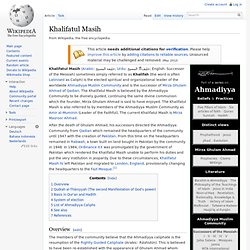
The Khalifatul Masih is believed by the Ahmadiyya Community to be divinely guided, continuing the same divine communion which the founder, Mirza Ghulam Ahmad is said to have enjoyed. The Khalifatul Masih is also referred to by members of the Ahmadiyya Muslim Community as Amir al-Muminin (Leader of the Faithful). The current Khalifatul Masih is Mirza Masroor Ahmad.
Imam al ghazali. Mujaddid. A mujaddid (Arabic: مجدد), according to the popular Muslim tradition, refers to a person who appears at the turn of every century of the Islamic calendar to revive Islam, remove from it any extraneous elements and restore it to its pristine purity.
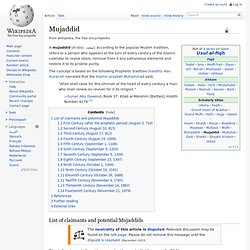
The concept is based on the following Prophetic tradition (hadith): Abu Hurairah narrated that the Islamic prophet Muhammad said; "Allah shall raise for this Ummah at the head of every century a man who shall renew (or revive) for it its religion. "